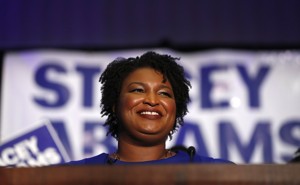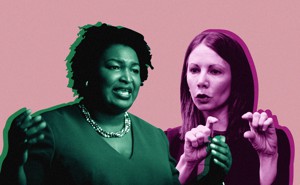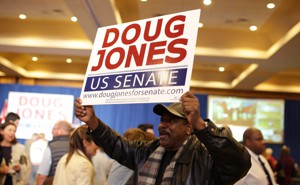Supercoolmayo
Superstar
What the Special Elections Will Mean
ATLANTA—Swanky fund-raisers don’t often begin with an apology to the well-heeled donors who shelled out thousands of dollars to sip wine, eat steak, and listen to pep-rally speeches. But as he looked out over a predominantly black crowd gathered at the Georgia Aquarium on Thursday night, Tom Perez, the Democratic National Committee chairman, felt compelled to issue a mea culpa.
“I am sorry,” Perez said.
At first, it seemed like Perez was voicing one more generalized regret for the 2016 election that put Donald Trump in the White House—the squandered opportunity that abruptly ended the Democrats’ hold on the presidency and immediately put at risk its policy gains of the previous eight years.
Become a member.
Join The Masthead, our new membership program, and get exclusive content—while supporting The Atlantic's future.
Join Now
Perez, however, soon made clear that his apology was much more specific. “We lost elections not only in November 2016, but we lost elections in the run-up because we stopped organizing,” he said. “We stopped talking to people.
MORE STORIES
“We took too many people for granted,” Perez continued, “and African Americans—our most loyal constituency—we all too frequently took for granted. That is a shame on us, folks, and for that I apologize. And for that I say, it will never happen again!”

Reverse Migration Might Turn Georgia Blue
ALANA SEMUELS
Who Does the Democratic Party Stand For?
ELAINE GODFREY
African American Voters Made Doug Jones a U.S. Senator in Alabama
VANN R. NEWKIRK II- Why Aren’t Top Democrats Acknowledging the Black Women Running for Office?
ELAINE GODFREY
Applause broke out before Perez could even finish his apology, heads nodding in acknowledgment and appreciation.
That he would choose this event, and this city, to try to make amends with black voters was significant. Thursday’s gala was the party’s first major 2018 fund-raiser to be held outside Washington, D.C., and the I Will Vote initiative it supported aims to bolster DNC efforts to register new voters; fight voter-suppression efforts in the United States; and, ultimately, turn out Democrats across the country in November.
High turnout among black voters was key to Barack Obama’s two presidential victories, and dips in participation when he was not on the ballot contributed to the Democratic wipeouts in 2010 and 2014, and to Hillary Clinton’s narrow losses in states such as Michigan, Wisconsin, and Pennsylvania in 2016. But there are signs of a revival, not only in response to Republican efforts to reverse Obama’s legacy, but also in response to efforts to erect barriers to voting that disproportionately affect African Americans. In Virginia, strong black turnout helped elect Governor Ralph Northam and the state’s second black lieutenant governor, Justin Fairfax, last November. A month later, black voters—and black women in particular—powered Doug Jones to victory over Roy Moore in Alabama’s special Senate election.


 And they'll be even more come Nov, and heading in 2020.. Only a number of times one can put out fires to save things before deciding to let that bytch burn to the ground
And they'll be even more come Nov, and heading in 2020.. Only a number of times one can put out fires to save things before deciding to let that bytch burn to the ground




